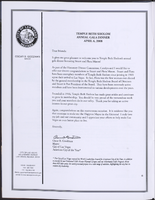Search the Special Collections and Archives Portal
Search Results

Meeting minutes for Consolidated Student Senate University of Nevada, Las Vegas, August 26, 1996
Date
1996-08-26
Archival Collection
Description
Includes meeting agenda and minutes, along with additional information about candidates handbook, roll call, and CSUN President's Advisory Council.
Text

Meeting minutes for Consolidated Student Senate, University of Nevada, Las Vegas, August 28, 2000
Date
2000-08-28
Archival Collection
Description
Includes meeting minutes and agenda, along with additional information about a performance contract and program.
Text
Pagination
Refine my results
Content Type
Creator or Contributor
Subject
Archival Collection
Digital Project
Resource Type
Year
Material Type
Place
Language
Records Classification








